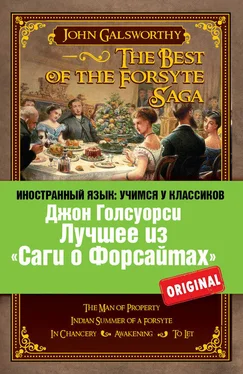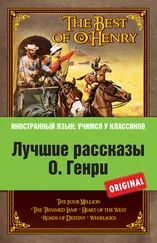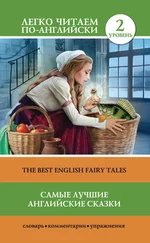“You see,” he heard Soames say, “we can’t have it all begin over again. There’s a limit; we must strike while the iron’s hot.”
Val freed his hand.
“But – you’re – never going to bring out that about the pearls! I couldn’t stand that – I simply couldn’t!”
Winifred cried out:
“No, no, Val – oh no! That’s only to show you how impossible your father is!” And his uncle nodded. Somewhat assuaged, Val took out a cigarette. His father had bought him that thin curved case. Oh! it was unbearable – just as he was going up to Oxford!
“Can’t mother be protected without?” he said. “I could look after her. It could always be done later if it was really necessary.”
A smile played for a moment round Soames’ lips, and became bitter.
“You don’t know what you’re talking of; nothing’s so fatal as delay in such matters.”
“Why?”
“I tell you, boy, nothing’s so fatal. I know from experience.”
His voice had the ring of exasperation. Val regarded him round-eyed, never having known his uncle express any sort of feeling. Oh! Yes – he remembered now – there had been an Aunt Irene, and something had happened – something which people kept dark; he had heard his father once use an unmentionable word of her.
“I don’t want to speak ill of your father,” Soames went on doggedly, “but I know him well enough to be sure that he’ll be back on your mother’s hands before a year’s over. You can imagine what that will mean to her and to all of you after this. The only thing is to cut the knot for good.”
In spite of himself, Val was impressed; and, happening to look at his mother’s face, he got what was perhaps his first real insight into the fact that his own feelings were not always what mattered most.
“All right, mother,” he said; “we’ll back you up. Only I’d like to know when it’ll be. It’s my first term, you know. I don’t want to be up there when it comes off.”
“Oh! my dear boy,” murmured Winifred, “it is a bore for you.” So, by habit, she phrased what, from the expression of her face, was the most poignant regret. “When will it be, Soames?”
“Can’t tell – not for months. We must get restitution first.”
‘What the deuce is that?’ thought Val. ‘What silly brutes lawyers are! Not for months! I know one thing: I’m not going to dine in!’ And he said:
“Awfully sorry, mother, I’ve got to go out to dinner now.”
Though it was his last night, Winifred nodded almost gratefully; they both felt that they had gone quite far enough in the expression of feeling.
Val sought the misty freedom of Green Street, reckless and depressed. And not till he reached Piccadilly did he discover that he had only eighteen-pence. One couldn’t dine off eighteen-pence, and he was very hungry. He looked longingly at the windows of the Iseeum Club, where he had often eaten of the best with his father! Those pearls! There was no getting over them! But the more he brooded and the further he walked the hungrier he naturally became. Short of trailing home, there were only two places where he could go – his grandfather’s in Park Lane, and Timothy’s in the Bayswater Road. Which was the less deplorable? At his grandfather’s he would probably get a better dinner on the spur of the moment. At Timothy’s they gave you a jolly good feed when they expected you, not otherwise. He decided on Park Lane, not unmoved by the thought that to go up to Oxford without affording his grandfather a chance to tip him was hardly fair to either of them. His mother would hear he had been there, of course, and might think it funny; but he couldn’t help that. He rang the bell.
“Hullo, Warmson, any dinner for me, d’you think?”
“They’re just going in, Master Val. Mr. Forsyte will be very glad to see you. He was saying at lunch that he never saw you nowadays.”
Val grinned.
“Well, here I am. Kill the fatted calf, Warmson, let’s have fizz.”
Warmson smiled faintly – in his opinion Val was a young limb.
“I will ask Mrs. Forsyte, Master Val.”
“I say,” Val grumbled, taking off his overcoat, “I’m not at school any more, you know.”
Warmson, not without a sense of humour, opened the door beyond the stag’s-horn coat stand, with the words:
“Mr. Valerus, ma’am.”
‘Confound him!’ thought Val, entering.
A warm embrace, a “Well, Val!” from Emily, and a rather quavery “So there you are at last!” from James, restored his sense of dignity.
“Why didn’t you let us know? There’s only saddle of mutton. Champagne, Warmson,” said Emily. And they went in.
At the great dining-table, shortened to its utmost, under which so many fashionable legs had rested, James sat at one end, Emily at the other, Val half-way between them; and something of the loneliness of his grandparents, now that all their four children were flown, reached the boy’s spirit. ‘I hope I shall kick the bucket [79]long before I’m as old as grandfather,’ he thought. ‘Poor old chap, he’s as thin as a rail!’ And lowering his voice while his grandfather and Warmson were in discussion about sugar in the soup, he said to Emily:
“It’s pretty brutal at home, Granny. I suppose you know.”
“Yes, dear boy.”
“Uncle Soames was there when I left. I say, isn’t there anything to be done to prevent a divorce? Why is he so beastly keen on it?”
“Hush, my dear!” murmured Emily; “we’re keeping it from your grandfather.”
James’ voice sounded from the other end.
“What’s that? What are you talking about?”
“About Val’s college,” returned Emily. “Young Pariser was there, James; you remember – he nearly broke the Bank at Monte Carlo afterwards.”
James muttered that he did not know – Val must look after himself up there, or he’d get into bad ways. And he looked at his grandson with gloom, out of which affection distrustfully glimmered.
“What I’m afraid of,” said Val to his plate, “is of being hard up, you know.”
By instinct he knew that the weak spot in that old man was fear of insecurity for his grandchildren.
“Well,” said James, and the soup in his spoon dribbled over, “you’ll have a good allowance; but you must keep within it.”
“Of course,” murmured Val; “if it is good. How much will it be, Grandfather?”
“Three hundred and fifty; it’s too much. I had next to nothing at your age.”
Val sighed. He had hoped for four, and been afraid of three. “I don’t know what your young cousin has,” said James; “he’s up there. His father’s a rich man.”
“Aren’t you?” asked Val hardily.
“I?” replied James, flustered. “I’ve got so many expenses. Your father….” and he was silent.
“Cousin Jolyon’s got an awfully jolly place. I went down there with Uncle Soames – ripping stables.”
“Ah!” murmured James profoundly. “That house – I knew how it would be!” And he lapsed into gloomy meditation over his fish-bones. His son’s tragedy, and the deep cleavage it had caused in the Forsyte family, had still the power to draw him down into a whirlpool of doubts and misgivings. Val, who hankered to talk of Robin Hill, because Robin Hill meant Holly, turned to Emily and said:
“Was that the house built for Uncle Soames?” And, receiving her nod, went on: “I wish you’d tell me about him, Granny. What became of Aunt Irene? Is she still going? He seems awfully worked-up about something to-night.”
Emily laid her finger on her lips, but the word Irene had caught James’ ear.
“What’s that?” he said, staying a piece of mutton close to his lips. “Who’s been seeing her? I knew we hadn’t heard the last of that.”
Читать дальше
Конец ознакомительного отрывка
Купить книгу

![Автор неизвестен Эпосы, мифы, легенды и сказания - Самые лучшие английские легенды [The Best English Legends]](/books/34729/avtor-neizvesten-eposy-mify-legendy-i-skazaniya-s-thumb.webp)










